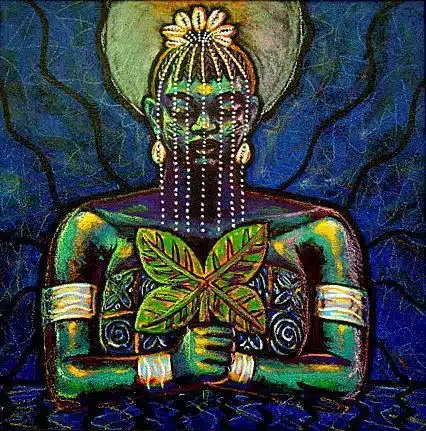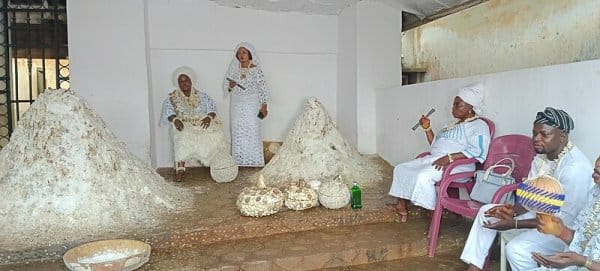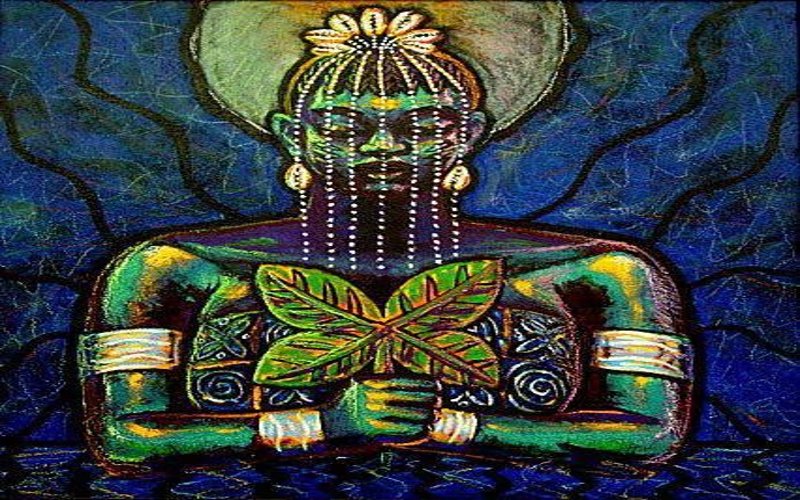Have you ever wondered what drives people to pursue wealth and prosperity? Is it simply a matter of wanting more money and possessions, or is there something more profound at play? For many people, the answer lies in the power of Orisha Ajé, a deity in Yoruba mythology associated with wealth, abundance, and prosperity.
At her core, Orisha Ajé is a powerful and sacred deity in Yoruba mythology. She is believed to bring good fortune, wealth and prosperity to those who worship and honor her. In Yoruba culture, she is seen as a symbol of prosperity and abundance, and her worship is often linked to the pursuit of wealth and material success.
But who exactly is Ajé?, and how does she shape the lives of those who worship her? In this blog post, we’ll delve into the mysteries of this goddess and explore her significance in the Yoruba religion and culture. We will also examine how she is worshiped, offerings, symbols, and the influence of this goddess across borders.
Names and Etymology of orisha Ajé
Pronouncing Ajé
One of the beauties of the Yoruba words is that one word would have the same spelling but can be pronounced differently. When someone who can or cannot read Yoruba sees the word AJE, what comes to their mind is A-jeh which means witch however AJE can also be pronounced as Ah-Jay, which is the Orisha we will be talking about in this blog post.
Meaning of Ajé
Ajé simply means wealth or money in Yoruba language.
Names of Ajé
- Ajé olokun.
- Ajé oguluso.
- Oniso iboji.
Mythology of Orisha Ajé
Daughter of olokun
Olóòkun is the parent of Ajé and he is the Orisa of great wealth that resides at the bottom of the ocean. People worship Olóòkun for the ability to give great wealth, health and prosperity.

However, the main function of this goddess is to provide plentiful wealth and greater economic benefits for her followers. She is the only daughter of Olóokun. This is the reason she is often referred to as Ajé Olóòkun. Therefore it is imperative to praise the goddess before getting a favor from Olóòkun.
Ajé and Ifa
Ajé is almost the female version of Ifa, this is why most times she is referred to as the wife of Ifa.
Characteristics of Orisa Ajé
- Ajé is associated with the color white, which is considered sacred in Yoruba culture. She is often portrayed wearing white clothing, and her followers often wear white during rituals and ceremonies in her honor.
- One of Aje’s most notable associations is with the day of the week known as Monday. In Yoruba culture, Monday is dedicated to her and is known as “Ojo Ajé,” which translates to “Aje’s day.” Ajé a wa o is commonly said when we see someone selling which means they will make sales.
- Despite her positive associations, Aje is also associated with certain taboos and restrictions. For example, she is not associated with bloodshed or rituals that involve blood. Additionally, she is not associated with any other colors apart from white, which is considered sacred in Yoruba culture.
Powers of orisha Ajé
Ajé is a powerful deity in Yoruba mythology, associated with a range of abilities and powers.
- One of her most notable powers is her ability to bring financial success and prosperity. In Yoruba culture, she is believed to have the power to attract abundance and remove poverty, making her a popular choice for those seeking financial success.
- According to Yoruba mythology, Ajé has the power to control the flow of resources and wealth. She is believed to have the ability to increase the amount of money available to individuals and communities, and to remove financial obstacles that may be preventing people from achieving their goals.
- In Yoruba culture, Ajé is also believed to have the ability to see into the future and to understand the hidden causes of financial problems. This allows her to identify the root causes of financial difficulties and to provide solutions that may not be immediately apparent to others.
- In addition to her financial powers, Ajé is also believed to have the ability to change situations and to solve problems. In Yoruba mythology, she is often portrayed as a transformative force, able to change the course of events and to bring about positive change.
Significance of Ajé to the Yorubas
- Orisa Ajé is believed to possess the ability to bestow financial abundance, success in business, and economic opportunities upon those who pay homage and seek her blessings.
- Orisa Ajé is associated with various aspects of commerce and trade. She is invoked by merchants, traders, and businesspeople seeking prosperity and profitable ventures. Her worshippers believe that through offerings, prayers, and rituals, they can establish a connection with her and seek her assistance in matters of finance and business.
- The significance of this goddess also extends beyond individual wealth. She is also seen as a deity who brings prosperity to communities and contributes to overall economic growth. Her blessings are sought during harvest festivals and communal ceremonies, where her devotees express gratitude and seek her favor for a bountiful and prosperous year.
- Her devotees believe that she has the ability to control and manipulate wealth, as well as the power to protect it from harm or misfortune.
Symbols associated with Orisa Ajé
![Ajé Shalunga belongs to the Yoruba Pantheon as one of the minor Orishas of the Yoruba religion.[1] The emblem of this orisha is a pearl shell.](https://g2x6m7g6.rocketcdn.me/wp-content/uploads/3-Aje_Shalunga.jpg)
Animals
- Pigeons.
- Guinea fowl.
- Duck.
- Pig.
- Sheep.
Objects
- Mirrors.
- Cowrie shells.
- Coins.
- Small white calabash.
- Money.
Color
- White.
Worship and offerings of Ajé

Offerings
- White egg.
- White Ekuru (Bean pudding).
- Duck.
- Sheep.
- Pigeons.
- Guinea fowl.
- Pig.
- Cowries.
- Money.
- Coins.
When all these items are brought together and her praises are recited with appropriate incantations, whatever is asked for during this period will be answered.
Oriki Orisa Ajé (Praise poetry of Ajé)
Oríkì is the oral praise poetry of the indigenous Yoruba communities of Western Africa.
Orí” means head
“Kì” means to praise, or greet, and offer accolades by way of a song or a chant.
First Oriki
Ajé Karo o
Ajé olokun
Ogugu luso
Ajé oniso booji
Asewe dagba
Asagba dewe
Eni ti eru ati omo n fi ojojumo wa kiri
Iwo ni labomon ti bori aye
Ajé Iwo lajiki
Ajé Iwo lajige
Ajé Iwo lajipe
Eni amusokun
Eni amusede
Iwo lani ra opolo aran aso oba ti kona
yaran yaran
Ajé agba orisha je ki ni lowo maje ki ni e lorun
Ajé fi Ile MI se ibugbe, fi odede MI se ibura, Ajé o jire loni oo.
Translation
Aje good morning
Aje you are the owner of sea
One who has shelter
Ajé you are the ones who people seek solace under your shield or umbrella
You are the ones who promote younger person to the position of elders
You make old look younger
You are the force and power that rule the world
Ajé it’s you that every human being sek every day they wake up
Ajé it’s you we wake up to greet
Ajé it’s you we wake up to praise
Ajé it’s you we wake up to call upon
Ajé it is through you we acquired beaded jewelries and golden jewelries
Ajé it is through you we acquired expensive clothes
Ajé, you are the the elderly of all orisha
Ajé, let me have you in form of money in my pocket not in form of debt on my name
Second Oriki
Oriki Aje 2
Ajé iwo lobi Ogun ilu
Ajé iwo lobi Olufa
Ajé iwo lobi onipasan owere
Oyale asin win so asin win di olowo
Oyale asi were oso asi were di eniyan-pataki
Ajé pe le oa kin lOrisas
Agede ni wo Ajenje lotu Ife ti o fi njo koo ti ni
Ajé dakun wa jo koo temi ki o ma kuro lodo mi.
Translation
Ajé gave birth to the war of the city
Ajé gave the light to the olufa
Ajé you gave the light to Onipasan owere
He went to the madman’s house and made him rich
He went to the crazy man’s house and made him a character
Ajé, I greet you, the last one who arrived among the Orisas
Ajé, eat banana fruit in Ifá so that you can come with one
Ajé please, come to me, stay with me and do not leave me.
Ajé Festival
Ajé festival is an annual festival in Ile Ife, Yoruba Land where the paramount ruler of ile ife ; the Arole Oodua, Ooni of ife, accommodates thousands of people from Africa and Africans in a diaspora trace roots to Nigeria to celebrate the goddess.
Ajé festival is a festival in which the goddess of wealth and the Ancestors of ile ife is being appeased with many sacrificial articles e.g Salt, honey, pigeons,ekuru funfun, banana etc.
Anybody who is seeking wealth, prosperity, economic prosperity, financial stability, good luck, fortunes, maintenance of wealth e.t.c can make offerings to the goddess. Because anyone who has a consecrated AJÉ and appeases her appropriately will never lack fortune in any form of trade. Individuals should have AJE and appease the goddess irrespective of race, color, or religion orientation.
Third Oriki – Iwure Ajé (prayers for wealth)
Lónìí Ọjọ́ Ajé,
Ajé olókun á sọ̀rọ̀ wa d’ayọ̀,
Ajé òní sá fún wa,
Ajé a súnmọ́ wa,
Ajé á f’ara bà wá,
Ajé òní ṣe tiwa tì,
Ajé ògúngúnúsọ̀, Onísọ̀ ibòògi, a sọ wá di olówó l’osẹ̀ yìí lásẹ Èdùmàrè.
Translation
Today is Monday
Ajé will turn our matters to joy.
Ajé will not run from us.
Ajé will be closer to us.
Ajé will touch us.
Our problems won’t be impossible for Ajé.
Ajé will make us wealthy this week by the power of the supreme god.
Orisha Ajé across borders
Santería:
In Santería, Orisa Ajé is often syncretized with the Catholic Saint Anthony (San Antonio) due to similarities in their domains of wealth and abundance. Devotees of the goddess in Santería seek her blessings for financial prosperity and success in business while incorporating Catholic rituals and iconography.
Offerings and rituals: Followers of Orisa Ajé in Santería offer items such as coins, banknotes, and other valuable symbols of wealth during ceremonies. Rituals may include prayers, songs, and dances to honor and connect with the deity.
Cultural expressions: Her influence can be observed in Afro-Cuban music and dance forms, where rhythms and movements associated with her are incorporated, reflecting her energetic and assertive qualities.
Candomblé:
Syncretism and association with Yemanjá: In Candomblé, the goddess is sometimes associated with the Yoruba deity Yemoja, who embodies aspects of the ocean, femininity, and abundance. This syncretism reflects the blending of Yoruba and local Brazilian traditions.
Rituals and offerings: Devotees of the goddess in Candomblé perform rituals and offer items such as cowrie shells, yams, palm oil, and other valuable commodities associated with wealth and prosperity. These offerings are made to seek the deity’s blessings and establish a connection with her.
Community celebrations: The goddess’s presence is felt during communal ceremonies and festivals in Candomblé, where her devotees express gratitude and seek her favor for a prosperous and abundant year.
Vodou:
Role in economic prosperity: In Vodou, Orisa Ajé’s worship focuses on her association with wealth, commerce, and economic well-being. Her devotees seek her blessings to attain financial abundance and success in business ventures.
Offerings and rituals: Offerings made to the goddess in Vodou may include coins, banknotes, and other symbols of wealth. Rituals, prayers, and dances are performed to honor and connect with the deity, seeking her assistance in matters of finance and business.
Cultural and artistic expressions: Her influence can be seen in the folklore, music, and artistic traditions of Vodou. Her energetic and assertive qualities are often portrayed through music, dance, and visual arts, showcasing her importance in Vodou cultural expressions.
Final Thoughts
Orisha Ajé, a powerful deity in Yoruba mythology, is associated with wealth, abundance, and prosperity. She is believed to bring good fortune and financial success to those who worship and honor her, and her worship is often linked to the pursuit of wealth and material success. She is also worshiped and sacred in other Afro-Caribbean religions such as Santería, Candomblé, and Vodou, where devotees seek her blessings for economic prosperity and success in business.
Featured Image Credit: Shani Ealey on Pinterest

